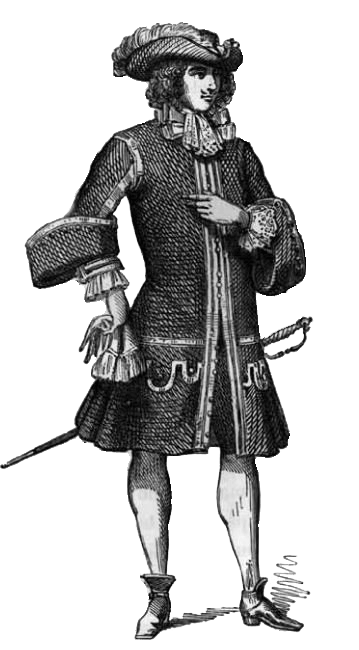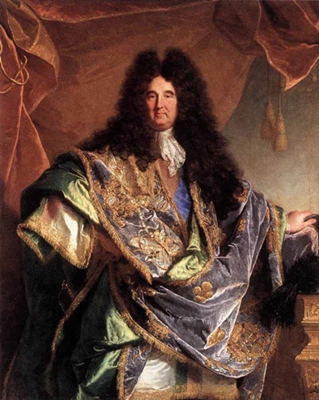Dangeau’s Diary, June 1685

1st. — The King’s daughter, Mademoiselle de Nantes, completed her twelfth year this day, and Madame de Montespan regrets that arrangements have not been made for the marriage to take place tomorrow. They will wait for the return of Monsieur le Duc from Burgundy, whither he goes the day after the carousal.
3rd. — The King gave audience to the Muscovite ambassadors upon his throne. They said nothing whatever to the King and only kissed his hand, made profound obeisances, and retired.
4th. — The King and the Dauphin dined rather earlier, and on rising from table the King and Monsieur got into their carriage. The Dauphine followed them in hers, attended by a great number of ladies. In the court of the secretaries of state, they found all the knights of the carousal in two troops and the pages and footmen. Monseigneur and the Duc de Bourbon were each at the head of the quadrilles. The King seated himself in the gallery prepared for him and we commenced the march by making the tour of the court of the secretaries of state. We then entered by the gate of the little court, which was on our left, made the tour of the court of the chateau and passed under the windows of the Duc de Bourgogne, who was in the balcony, After having traversed that court, we quitted it through the gate of the chapel court, and again marched round the court of the secretaries of state and continued the procession by passing between the two grand stables, then entering the manége by a gate made expressly, very near the Chenil. We then turned to the left, and after having passed before the galleries, we again entered the manége, where we performed the comparse, which, as well as the march, was considered admirably regulated and executed. The comparse being concluded, we all marched to our posts, which were at the four corners of the manége, having our twenty knights at each corner, with their pages and footmen behind them and kettle-drums and trumpets in the angles outside the barriers. Monseigneur then began to run against the Duc de Bourbon, accompanied by messieurs de Vendome and de Brionne, in order to make the figure, but the courses of those gentlemen were not reckoned. The subject of the carousal was taken from the wars of Grenada.There were the Abencerrages and the Zegris. Monseigneur was chief of the first, and Monsieur de Bourbon of the others. To the Abencerrages had been joined the Zasuls, the Alabezes and the Almoradis. To the Zegris, the Elaneques, the Gometis and the Muces. So that, although there were only two parties, there were eight troops distinguished by their colours. The Duc St. Aignan was marshal general, the Duc de Grammont commanded the Alabezes and the Almoradis, and I, the Abencerrages and the Zasuls. The Duc d’Uzes and the Marquis de Tilladet were marshals of the Zegris, and each commanded twenty. The Duc de la Roche-Guyon and the Prince de Furstemburg were taken ill and could not run. There was one course for the ladies, and then three for the prize, which was won by Prince Camille de Lorraine. He carried off eleven heads in the three heats, and no one contended with him. He belonged to the Zasuls. The prize was a very handsome diamond sword, which he went to receive on horseback from the hands of the King, who was in his gallery. After the tilting was concluded, we all entered the manége by the four quarters where we were posted, and made a small comparse before the King, who was much pleased with it. We then marched back into the great court of the chateau, in the same order in which we came. Monsieur de Saint-Aignan, Monsieur de Grammont, Monsieur d’Uzes, Tilladet, and I, saluted the King with the sword and all the knights, whom we led, marched lance in hand.
5th. — The carousal recommenced, and notwithstanding the bad weather which incommoded us very much, the King found the sight much more splendid than the first day. The course for the ladies was shortened; the Marquis de Pleumartin, who was Alabeze, of the Abenccrrage party, under the Duc de Grammont, carried off the twelve heads in three courses. No one disputed the prize with him, which he came to receive from the hands of the King. It was a diamond sword of exquisite workmanship, and about the same value as that won by Prince Camille.
8th. — Monsieur de Louvois has returned from the river Eure, where he had been to see the works carrying on. There will be nearly 1600 arches to the aqueducts constructing there, of which some will be twice as high as the towers of Notre Dame. Besides these 1600 arches, there will be many smaller ones not taken into the account.
10th. — Monsieur le Prince performed his devotions at his parish church, St. Sulpice. An immense concourse of people were present, and were much edified at the sight of so much piety.
12th. — Letters have been received from the Princes de Conti. They have been to Vienna, but did not see the Emperor. The Princes de Conti did not see the Emperor, because they wished to have a chair in front of him, like the Electors, and refused to be received standing, rejecting all the honours which they shewed them, being firm respecting the chair.
15th. — The King broke the company of Cadets of Charlemont, because they had assembled seditiously and had rescued one of their comrades, who was going to be put to death for having fought a duel. Seventeen of them, not satisfied with having rescued him from the scaffold, escorted him as far as Namur, and afterwards returned to Charlemont. These seventeen have been obliged to draw lots, and two of them will be shot.
21st. — We heard the particulars of the duke of Monmouth’s landing in England; he declared that he returned into his country to maintain the interests of the Anglican church against the Duke of York and he has taken a small town, in which was a garrison of eight hundred militia men.
23d. — The King sent Monsieur Duras, to see the Duc de la Force, who was thought to be dying, and to know if he would not think of abjuring his error. Monsieur de la Force thanked the King for his goodness and his anxiety, but remained true to his religion.



